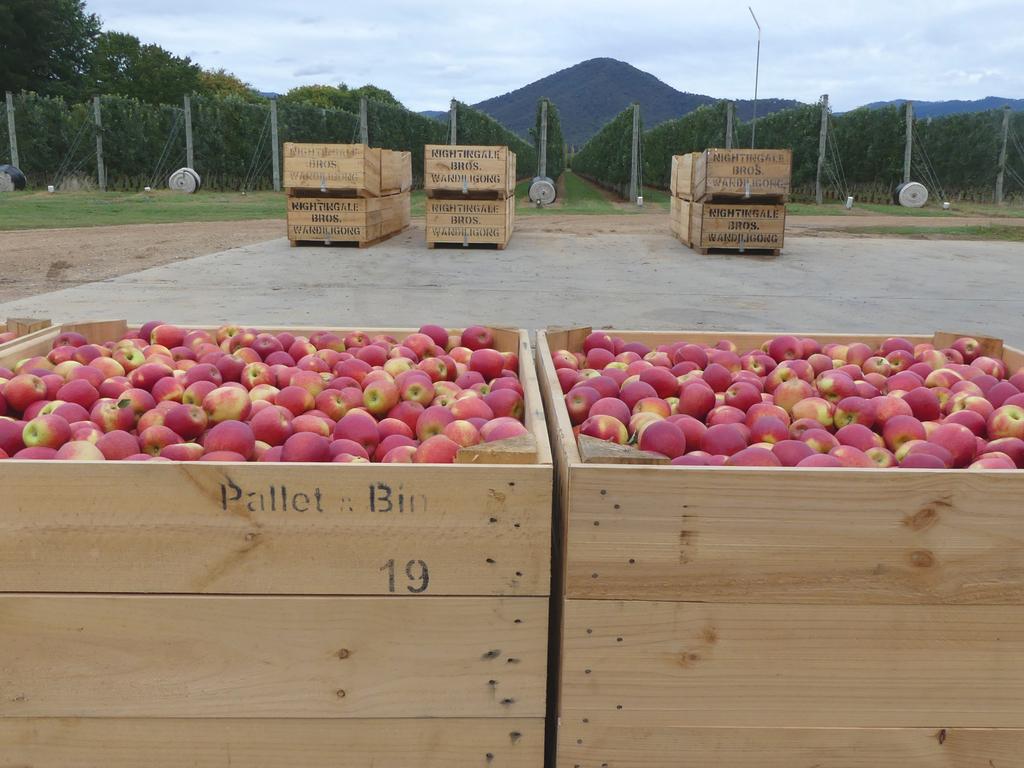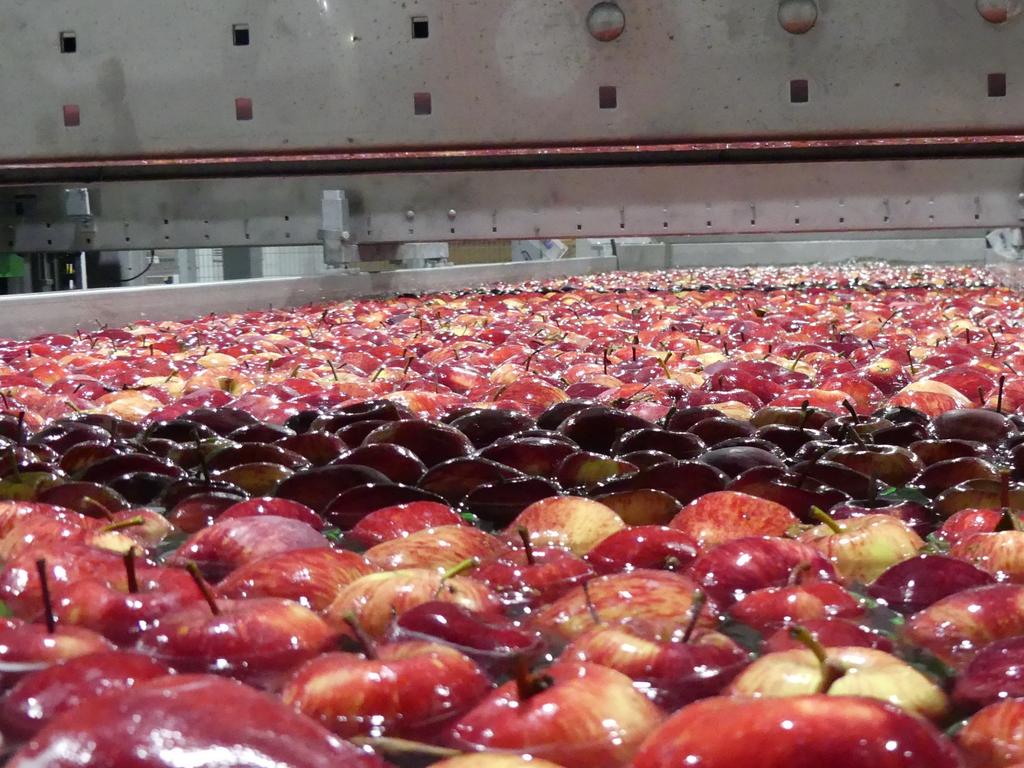Modern orchards pay the way for Nightingale Brothers
As costs of production soar and prices dive for fruit growers, Nightingale Brothers say their saving grace has been an increase in orchard efficiency.
The Nightingale Brothers have a long, proud history in the apple growing game and their key to success, beyond hard work, passion and drive, has been to ensure they evolved with modern innovations to remain relevant.
This has been made particularly clear in the current climate with a downturned wholesale market and rising costs of production narrowing margins to break-even point on some varieties.
Don Nightingale said they were thankful for having modernised and streamlined their orchards in the Wandiligong Valley over the last decade, which had enabled them to double production per hectare and help counteract the downturn, to a point.
“Right now the fruit game is on a lull. There is an over production and prices are not where we’d like them to be. We are faced with increasing costs all the time, particularly labour and freight. Fertiliser has doubled and a lot of chemicals have doubled,” Don said.
“As fruit growers we are looking all the time how to do it cheaper and cut costs.”
KEEPING AHEAD
For the past 15 years they have been moving towards intensive orcharding to not only increase their production per hectare but double it from an average of 40 tonnes a hectare to 80 tonnes/ha with new planting and growing systems.

They have introduced vertical trellis with dwarf root stocks that have enabled them to grow 3000 to 4000 trees a hectare, up from 600 to 800/ha the traditional way. Trees are spaced one metre apart, down from 3.5 metres.
“You are growing a very thin tree now. It’s nearly a branchless tree. There is no big structure, no big limbs, it is a very fine tree,” Don said.
“Dwarfing root stocks really fill their space and then close down and just grow fruit.”
It wasn’t cheap to make the change.
“It was a big expense for infrastructure,” Don admits.
“We reckon it cost in excess of $120,000 to replant a hectare – that’s trees, trellis, water, netting, labour.
“We hope we are making that money back. Our production per hectare is still climbing. There are New Zealand growers getting upwards of 100 tonnes/ha and our best is about 80 tonnes/ha to 85 tonnes/ha but there are new systems and new thoughts coming through all the time. New Zealand growers are very progressive and they have brought their ideas to us.”
AN EARLY START
The Nightingales have been growing apples at Wandiligong, 5km from Bright, for almost 70 years since Keith Nightingale and his brother Alan bought a primitive orchard in 1954 and moved there from Doncaster.
“There was no electricity, the roads were rough, and the house was no better than a chook pen. It was quite a shock after being so near to Melbourne,” Keith said.
“It was an even bigger shock for my wife, Marianne who had grown up in The Hague in Holland. Marianne had migrated to Australia with her parents not long after the war and we met when she came to our orchard looking for work.”
Now three generations on, the Nightingale family has five orchards; two at Wandiligong, one in the Buckland Valley below Mount Buffalo, one at Stanley and another at Batlow in southern NSW.

Keith and Marianne still help out in the business, which is now run by their children Don, Ross, Bruce and Ann, their respective partners and children.
“Some time ago, my father’s brother died and we bought that family out and have carried on,” Don said. “I have three nephews now that work in the business.”

POPULARITY CONTEST
Pink Lady is the number one apple currently sold in Australia and the Nightingales produce 7000 bins of the variety each year, along with 2000 bins of Gala, 2000 Granny Smiths, 1000 Fujis and 1000 Red Delicious.
They also contract grow 2500 bins of Club varieties, which include Kanzi, Envy and Jazz.
“The varieties are changing all the time but Pink Lady are the most solid at the moment. Red Delicious used to be more prominent. We used to grow 7000 bins of those but now only 1000 because Pink Lady have taken over that market,” Don said.

The cool, elevated conditions and 1300mm to 1500mm annual rainfall makes for perfect apple growing conditions at Wandiligong.
There are two irrigation systems in place; one for overhead frost control and another for drip feeding trees. Fertiliser can also be directly applied through the drippers and there has been revolutionary efficiency increases through the netting of orchards.
“Netting gives much better fruit. It takes the risk of hail damage out, there is less sunburn, less bird damage and less irrigation needed because it is a kinder environment under the net,” Don said.
“If you get a hailstorm you lose an entire crop in five minutes so it (netting) takes that risk out of it. It is very valuable and protects your investment totally. Prior to this we have lost total crops through hail.”
Integrated Pest Management is used to minimise chemical use on crops and agronomists advise on necessary fertiliser applications. The Nightingales are also looking into weed machines to help with weed control and further reduce the need for chemical sprays.

PICKING AND PACKING
Harvesting takes 12 weeks, beginning in February with Royal Gala and finishing in May with Pink Ladies.
Three years ago the Nightingales introduced four picking platforms for harvesting to help increase efficiencies and counteract the changed workforce conditions. The platform machines, which cost about $150,000 each, have an elevator system so pickers no longer need to use ladders or carry bags and don’t need prior picking experience.

Once picked, the bins are taken to the on-site packing shed, which has a cool room storage capacity for 13,000 bins, and a modern packing line including a state of the art apple presizer, installed two years ago at a cost of $3 million.
The pack-house operates for 12 months of the year and employs 20 to 50 permanent and semipermanent staff and up to 150 people at peak capacity.
An agent sells the fruit into markets in Melbourne, Sydney, Brisbane and Adelaide.
The Nightingales also produce 400 tonnes of Chestnuts a year off 150ha, sold to the same major markets as their apples.


COSTS SNEAKING AHEAD
“The last few years have been very tough. Not much better than break even,” Don said.
“Our best selling apple is Pink Lady and premium pinks are say $25 for 12kg whereas in 2020 they might have been over $30.
“Eight years ago we had tough times and then we had seven or eight years of good sales and now we are in the lull at the moment. It’s not uncommon. When things are good, fruit growers plant paddocks and invest in trees and then it gets to this stage and then you’ve got to bulldoze things.”
Don said they continued to look for ways to increase efficiencies but it was hard in the current climate.
“There is a lot of hurdles today that weren’t there in the past. The average cost of production over the past three years has increased from $220 per bin to $320 per bin (400kg). This is the cost from tree to bin in the orchard. There is additional costs for freight to the storage facility and cool storage costs,” Don said.
“Our cost of production has gone up but so has our tonnage so one should be cancelling out the other but our cost of production we think is sneaking away.
“All you can do is ride it out. When things are bad you’ve got to hang on and do the best you can.”




